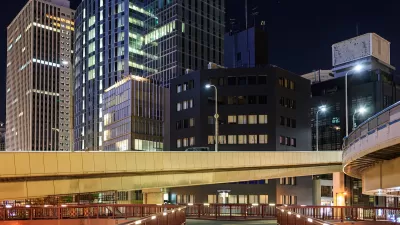To date, no loans have closed through a federal program meant to spur office-to-residential conversions.

Regulatory and financial barriers have prevented developers seeking to take advantage of the federal government’s office-to-residential conversion incentive program from closing on any loans, reports Kriston Capps in Bloomberg CityLab. The funds are being directed to office-to-housing projects near transit and funded via the U.S. Department of Transportation.
According to Capps, “Lengthy approvals, strict environmental reviews and tight credit criteria — standards designed with interstate rail projects in mind — have put this financing out of reach for many developers.” Although no loans have closed, three projects are currently in an underwriting phase.
The program requires a $1 million non-refundable deposit and a costly National Environmental Policy Act (NEPA) review, which developers argue is unnecessary for a building conversion. In some cases, projects that are located near certain types of transit don’t qualify under federal guidelines.
FULL STORY: Why a White House Plan to Fund Office-to-Housing Conversions Isn’t Working

Planetizen Federal Action Tracker
A weekly monitor of how Trump’s orders and actions are impacting planners and planning in America.

San Francisco's School District Spent $105M To Build Affordable Housing for Teachers — And That's Just the Beginning
SFUSD joins a growing list of school districts using their land holdings to address housing affordability challenges faced by their own employees.

The Tiny, Adorable $7,000 Car Turning Japan Onto EVs
The single seat Mibot charges from a regular plug as quickly as an iPad, and is about half the price of an average EV.

With Protected Lanes, 460% More People Commute by Bike
For those needing more ammo, more data proving what we already knew is here.

In More Metros Than You’d Think, Suburbs are Now More Expensive Than the City
If you're moving to the burbs to save on square footage, data shows you should think again.

The States Losing Rural Delivery Rooms at an Alarming Pace
In some states, as few as 9% of rural hospitals still deliver babies. As a result, rising pre-term births, no adequate pre-term care and "harrowing" close calls are a growing reality.
Urban Design for Planners 1: Software Tools
This six-course series explores essential urban design concepts using open source software and equips planners with the tools they need to participate fully in the urban design process.
Planning for Universal Design
Learn the tools for implementing Universal Design in planning regulations.
Smith Gee Studio
City of Charlotte
City of Camden Redevelopment Agency
City of Astoria
Transportation Research & Education Center (TREC) at Portland State University
US High Speed Rail Association
City of Camden Redevelopment Agency
Municipality of Princeton (NJ)





























